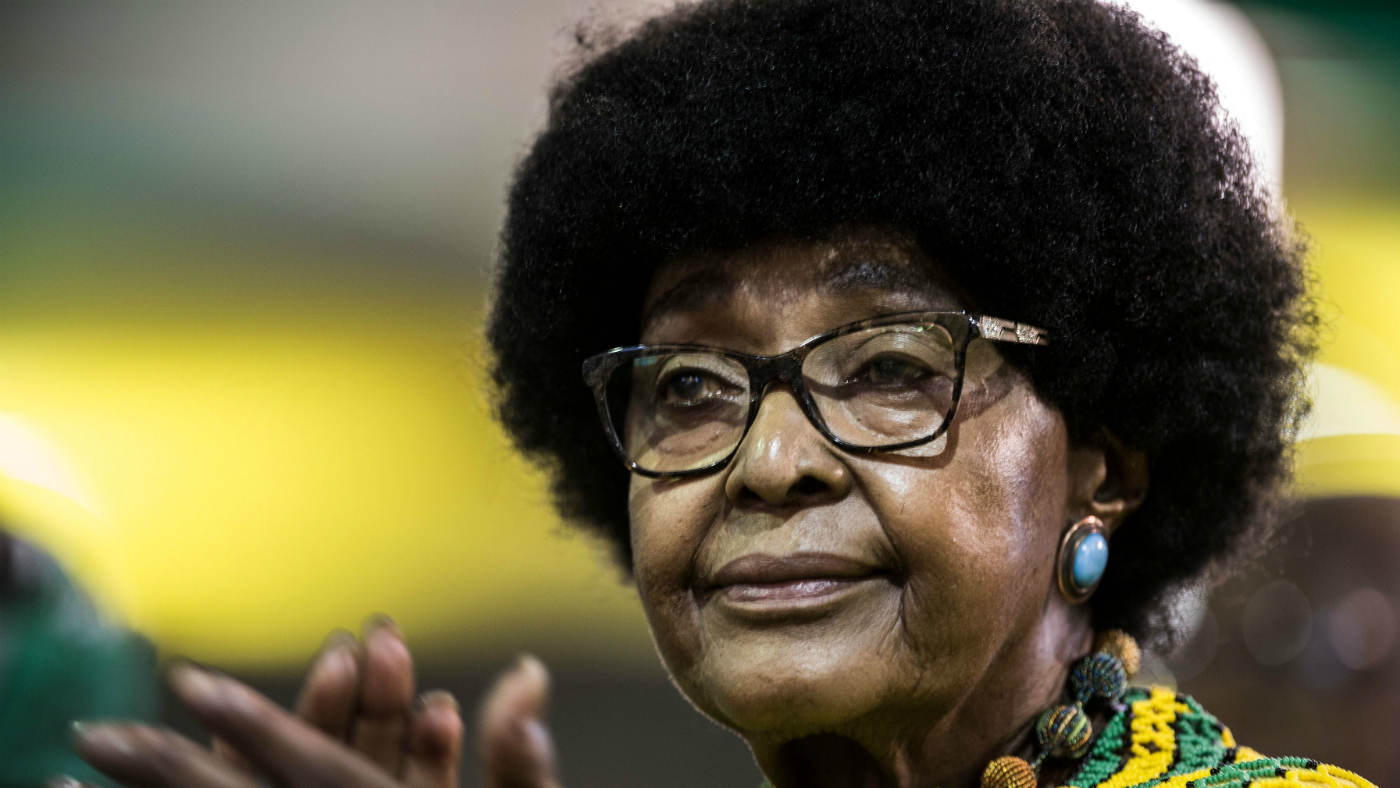Winnie Mandela, South African anti-apartheid activist, dies at 81
Archbishop Desmond Tutu leads tributes to one-time political prisoner and former wife of Nelson Mandela

A free daily email with the biggest news stories of the day – and the best features from TheWeek.com
You are now subscribed
Your newsletter sign-up was successful
South African freedom fighter Winnie Madikizela-Mandela has died in Johannesburg after a lengthy illness.
The 81-year-old political activist and former wife of Nelson Mandela, who became an international symbol of the fight against apartheid, died in hospital on Monday surrounded by family.
Archbishop Desmond Tutu led the tributes to the African National Congress stalwart, who was tortured and imprisoned by security forces for campaigning for the rights of black South Africans.
The Week
Escape your echo chamber. Get the facts behind the news, plus analysis from multiple perspectives.

Sign up for The Week's Free Newsletters
From our morning news briefing to a weekly Good News Newsletter, get the best of The Week delivered directly to your inbox.
From our morning news briefing to a weekly Good News Newsletter, get the best of The Week delivered directly to your inbox.
“Her courageous defiance was deeply inspirational to me and to generations of activists,” he said. “May she rest in peace and rise in glory.”
Known as the Mother of the Nation, Madikizela-Mandela was a powerful but deeply divisive figure who left a complex legacy, South Africa’s Daily Maverick reports.
Her political work has been overshadowed by accusations of murder, kidnapping and corruption.
In 1991, she was convicted of kidnapping teenage activist Stompie Moeketsi, who was killed by her personal bodyguards, a deadly vigilante group known as the Mandela United Football Club.
A free daily email with the biggest news stories of the day – and the best features from TheWeek.com
The Truth and Reconciliation Commission, tasked with investigating Apartheid-era crimes, found her guilty of committing “gross violations of human rights” during the liberation struggle.
Madikizela-Mandela was known to have opposed the reconciliatory approach assumed by Mandela and Tutu after apartheid, the Mail and Guardian reports.
“Her decreasing tolerance for the reconciliation project culminated in her dismissal from cabinet in 1995 for allegedly defying presidential orders and sowing divisions through her constant criticism of government,” it adds.
Madikizela-Mandela showed little remorse for her actions. “I am not sorry,” she said in a 2010 interview. “I will never be sorry. I would do everything I did again if I had to. Everything.”
-
 Political cartoons for February 13
Political cartoons for February 13Cartoons Friday's political cartoons include rank hypocrisy, name-dropping Trump, and EPA repeals
-
 Palantir's growing influence in the British state
Palantir's growing influence in the British stateThe Explainer Despite winning a £240m MoD contract, the tech company’s links to Peter Mandelson and the UK’s over-reliance on US tech have caused widespread concern
-
 Quiz of The Week: 7 – 13 February
Quiz of The Week: 7 – 13 FebruaryQuiz Have you been paying attention to The Week’s news?
-
 Epstein files topple law CEO, roil UK government
Epstein files topple law CEO, roil UK governmentSpeed Read Peter Mandelson, Britain’s former ambassador to the US, is caught up in the scandal
-
 Iran and US prepare to meet after skirmishes
Iran and US prepare to meet after skirmishesSpeed Read The incident comes amid heightened tensions in the Middle East
-
 Israel retrieves final hostage’s body from Gaza
Israel retrieves final hostage’s body from GazaSpeed Read The 24-year-old police officer was killed during the initial Hamas attack
-
 China’s Xi targets top general in growing purge
China’s Xi targets top general in growing purgeSpeed Read Zhang Youxia is being investigated over ‘grave violations’ of the law
-
 Panama and Canada are negotiating over a crucial copper mine
Panama and Canada are negotiating over a crucial copper mineIn the Spotlight Panama is set to make a final decision on the mine this summer
-
 Why Greenland’s natural resources are nearly impossible to mine
Why Greenland’s natural resources are nearly impossible to mineThe Explainer The country’s natural landscape makes the task extremely difficult
-
 Iran cuts internet as protests escalate
Iran cuts internet as protests escalateSpeed Reada Government buildings across the country have been set on fire
-
 US nabs ‘shadow’ tanker claimed by Russia
US nabs ‘shadow’ tanker claimed by RussiaSpeed Read The ship was one of two vessels seized by the US military